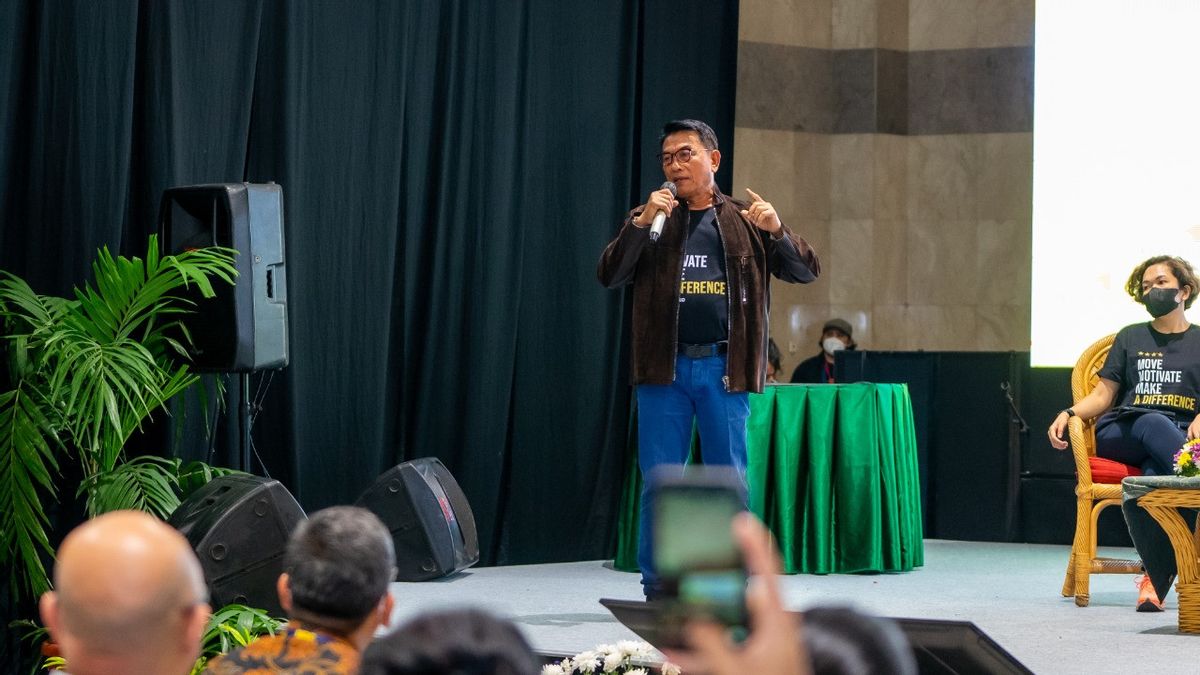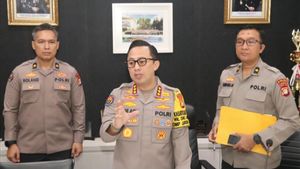JAKARTA - The military and business world, although in some ways it has differences that are diametric but still has close counsel. A military leader can learn many things from the business world, and vice versa.
Former TNI commander who now serves as Presidential Chief of Staff, General Moeldoko explained this through his experience, both as a soldier, businessman and government employee.
As a businessman, the principle of knowing your customer, understand what the customer needs may have become a daily consumption. If you want to be successful, business people must really understand their customers, understand what they need.
While as a soldier, maybe that's something unusual. However, in truth, a good and wise leader should know more closely his subordinates ascustomers and try to understand what they want.
During his time as a soldier, General Moeldoko once gave a message, "Look at my daughter, not with the naked eye, but with the eyes of the heart."
Thus, a military leader can better understand the hidden desires of his subordinates. When conducting research on border areas for his doctoral program, Moeldoko realized that raising the spirit of soldiers in the outermost regions of Indonesia and the people in the border area was connectivity.
Unfortunately, connectivity is often only understood as a physical interrelation: building bridges, highways, power grids, and other infrastructure. Whereas connectivity in a broader sense can also be unphysical, namely intensive communication between the government and the leading community at the border with a communication that can touch emotions and feelings.
Those there need to be turned on, humanized. This is their deepest conscience. This may be what in business language is called understanding anxiety and passion," said General Moeldoko in his latest book M-Leadership, Dare to Love him.
Vice versa, there are a number of things in the military world that are also useful in the business world. Like the story of Eddie Rickenbacker (1890-1973), a fighter pilot from the United States with the most brilliant record during World War I that led him to the award of the Medal of Honor and various other service stars.
After World War I, Rickenbacker served as Vice President on Eastern Air Transport (one of America's biggest airlines which later changed its name to Eastern Air Lines). His courage to take risks does not only apply on the battlefield. In this company he made a big breakthrough by changing the total way his business is.
When all airlines can survive by leaning themselves on government subsidies, Rickenbacker prefers that his business can run independently. Rantang for him begging for subsidy funds.
His courage bore fruit. Within 2 years Eastern Air Transport was able to record a profit, for the first time in the history of world airlines. Rickenbacker continued to lead the company brilliantly for 30 years and retired at the age of 73.
The story, according to General Moeldoko, strengthens the hypothesis that some experts believe that the military world could become a candradimuka crater that effectively gave birth to great leaders.
General Moeldoko cites Tom Kolditz's theory, director of the Leadership Development Program at the Yale School of Management, as soldiers are educated with highly structured training and coaching models, surpassing those in the business world and government.
"Secondly, the military greatly emphasizes the importance of a sense of responsibility for each of its members, even down to the lowest level. And lastly, and perhaps most importantly, military leadership was built based on the concept of service and sacrifice," said General Moeldoko.
In fact, according to Dan norms and Saul Singer in the book Start-Up Nation, the military world is considered to be able to contribute to the growth of the entrepreneurial spirit in a country.
There are also many new concepts in the science of business management and leadership inspired by war strategy books such as The Art of War by Sun Tzju, military general and Chinese strategist, Carl von Clausewitz' book On War (1780-1831), military officer as well as Prussian strategist, and Mao Zedong's The Little Red Book (1893-1976), founder of the country of the People's Republic of China.
"This is one of the reasons why I was interested in taking the MBA (Master of Business Administration) program when I was still serving as Commander of Kodim 0501/Central Jakarta in 1997," said General Moeldoko.
One of General Moeldoko's work in the business sector is to establish an electric-powered bus factory. In addition, Moeldoko is also active in the realm of the sharia economy. Together with his son, it is known that he founded sharia fintech that is oriented to help Micro, Small and Medium Enterprises (MSMEs).
Even so, added Moeldoko, as stated by General Sudirman, "The army is not a group outside the community, it is not a caste that stands above the community. The army is nothing but part of a society that has certain obligations".
"If you only rely on military organizations, it's like building a house with a foundation. There needs to be something else that complements it, and it's a civilian institution and a business organization. Civil institutions here can be interpreted widely, including government and non-governmental organizations," added General Moeldoko.
The English, Chinese, Japanese, Arabic, and French versions are automatically generated by the AI. So there may still be inaccuracies in translating, please always see Indonesian as our main language. (system supported by DigitalSiber.id)









